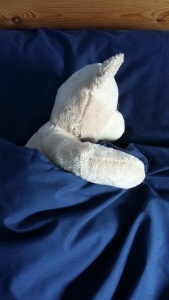
Inside Yoga 271 (10/6/2019)
A leading neurologist has warned that sleep trackers are causing people to become so stressed and anxious about their sleep that they lose sleep and develop insomnia, which is the opposite of what these devices are designed and advertised as doing.
Dr Guy Leschziner, a sleep disorder specialist and consultant at Guy’s hospital in London, said at the Cheltenham science festival that a growing preoccupation with getting enough sleep was backfiring.
“We’ve seen a lot of people who have developed significant insomnia as a result of either sleep trackers or reading certain things about how devastating sleep deprivation is for you,” Leschziner said before his talk.
According to the Guardian newspaper Leschziner said that a high proportion of patients seeking treatment for insomnia turn up at his clinic with data about their sleep patterns and are often reluctant to delete the app: “It’s rather difficult to dissuade them from using it,” he said.
The doctor added that most apps have not been clinically validated and only track movement, so do not provide insight into the quality of sleep.
“My view of sleep trackers is fairly cynical. If you wake up feeling tired and you’ve had an unrefreshing night’s sleep then you know you’ve got a problem,” he said. “If you wake up every day and feel refreshed, are awake throughout the day and are ready to sleep at the same time every night then you’re probably getting enough sleep for you and you don’t need an app to tell you that.”
The Guardian reported that similar concerns were highlighted in a series of case studies published last year by a team in Chicago that described patients whose micromanagement of sleep using apps had led to a disorder called orthosomnia.
Research shows that for most people the optimum amount of sleep is around eight hours, but this varies widely across the population. For people who naturally need less sleep, being alerted to the fact that they are not sleeping “enough” could result in the nocebo effect, where the expectation of negative symptoms leads to people actually feeling worse.
Speaking in the same session at the festival, Stephanie Romiszewski, a sleep psychologist based in Exeter, said: “Everybody sleeps differently and can have a different duration. And therefore if you take a generic sleep tracker and it (says) you haven’t had the right amount of sleep, that can start to worry you.”
Leshchziner said measuring sleep was part of a broader tendency to “metricise our lives” using technology to count how many steps we have taken, how many online friends we have and how we spend our money. With sleep, this trend is particularly problematic, he said. “If you’re measuring your steps and you realise you’re not walking as far as you should you just do a bit more exercise. When you get into that obsessive state about sleep it makes sleep even more difficult.”
I agree with a lot of what these scientists are reporting because it highlights that we are giving up a lot of our inherent skills as humans to know what feels right, and to learn through practice what is best for us. As Leschziner says, we can tell if we are getting enough sleep or not by how we feel the next morning. But we ignore what we feel, and we do not respond appropriately by going to bed earlier or eating/drinking less before trying to sleep.
This report also relates to an article I posted recently about sleep, which explained that for example, waking up in the night is natural and normal, as sleep patterns show that deep sleep runs in approximately 90 minutes intervals, so most of us will stir during the night, waking up at times. The best response to this is to stay calm, and wait for sleep to take over again, remaining quiet and in the dark to allow this… technology will not help what is a natural pattern.
If we cultivate a yoga practice which helps us to relax and unwind our sleep will improve, as will practising meditation. When awake at night try meditating lying down, simply watch your breathe and keep the breath deep, slow and steady. Be patient and allow sleep to take over. No need to track or count with a gadget.
To read Guardian report, see https://www.theguardian.com/lifeandstyle/2019/jun/07/sleep-apps-backfire-by-causing-anxiety-and-insomnia-says-expert
To read related articles on my Blog page:
Bedtime social media warning – https://www.yogabristol.co.uk/2019/03/04/bedtime-social-media-warning/
All we need is sleep – https://www.yogabristol.co.uk/2019/02/25/all-we-need-is-sleep/
Your Comment: Let me know what you think. See reply panel below or email me, gary@yogabristol.co.uk

7 years ago ·
This has been one of my big bug bears with all this wearable tech that people seem to be welded to – I have a friend who will come down in the morning and state “I thought I had a really good night’s sleep – but my fitbit is telling me I didn’t”. Errrr surely if she felt rested and as though she had a good night’s sleep, she did?
6 years ago ·
[…] Sleepless nights due to sleep trackers: https://www.yogabristol.co.uk/2019/06/10/sleepless-nights-due-sleep-trackers/ […]